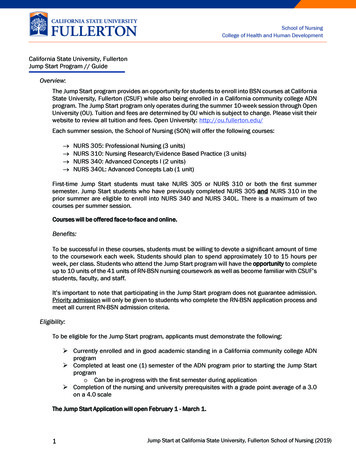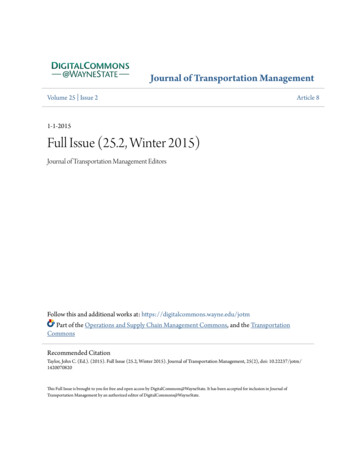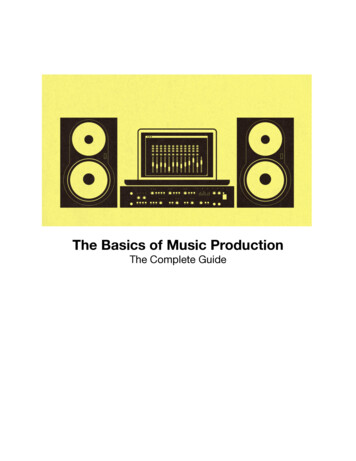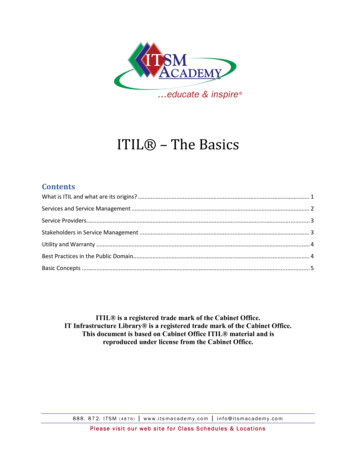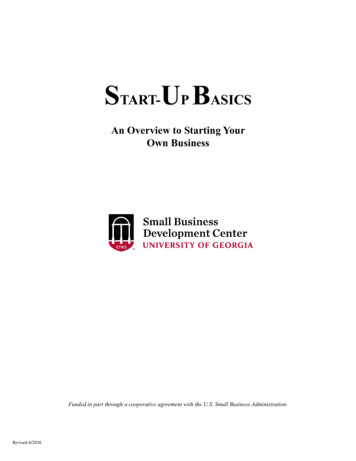
Transcription
START-UP BASICSAn Overview to Starting YourOwn BusinessFunded in part through a cooperative agreement with the U.S. Small Business Administration.Revised 6/2016
IntroductionThis manual is a publication of The University of Georgia Small Business Development Center.Business consulting, information, and publications are available through the UGA SBDC officeslisted at the end of this publication.The SBDC program is designed to provide quality business and economic development assistance tobusinesses and prospective businesses in order to promote growth, expansion, innovation, increasedproductivity, and improved management. These objectives are accomplished by providing one-onone consulting and business training programs, assisting clients with exporting and procurement,supporting minority business development, conducting applied economic research, and fosteringrural development.This material is designed as a step-by-step introduction to the issues every new business must face.Our primary goal is to present a “way of thinking” that will help you plan, start, and successfullyoperate your business. Short cuts are not recommended.Business consultants are available for individual conferences, but your advanced preparationis required. Please complete the “Business Development Questionnaire” (BDQ) located in theappendix and return the results to the office most convenient to you. The approach presented inthis kit will help you complete the BDQ and evaluate various business decisions.If you decide to pursue your idea, completion of a detailed business plan will probably be the nextstep, and UGA SBDC consultants can assist you. The preliminary work covered in this manualwill put you well on your way toward an effective business plan.Thank you and good luck.
Table of ContentsSTEP 1:Is My Business Idea Feasible?.1Ask Yourself Some Tough QuestionsResearching Your MarketBreak-Even AnalysisSTEP 2:Operating Legally.4An OverviewInformation Sources for BusinessSTEP 3:Building Your Team.12STEP 4:Financing Your Business.13How Much Money Do You Need to Start This Business?Steps in Financial ProjectionsWhere Do I Get the Money?STEP 5:Pulling It All Together.17Why Write a Business Plan?Business Plan Outline
Before you begin or as you develop your business, whether you are new to the state or not, feelfree to contact the University of Georgia Small Business Development Center for free consulting,guidance, and direction. Find your local office at www.georgiasbdc.org.STEP 1: Is My Business Idea Feasible?Ask Yourself Some Tough Questions.Do you have what it takes to start your own business? Many people feel that they only lackthe money to start or only need help with the legal and tax issues, but these are just a few of theconsiderations entrepreneurs need to address. The following are a few of the questions every newentrepreneur should consider. When answering these questions, think of an example.oDo I have confidence and optimism about my ability to overcome obstacles?oDo I accept responsibility for my actions?oDo I like being in charge?oAm I able to function in an environment of uncertainty?oAm I able to motivate and inspire people?oAm I an effective salesperson?oAm I a fair negotiator?oDo I understand my own limitations and know when I need to ask for help?oAm I easily discouraged?oAm I willing to devote whatever time and energy it takes to be successful?oIs the risk of my financial assets worth the expected rewards?oDo I have a history of success at things to which I am committed?oDo I have a strong support group of family and friends?Is My Business Idea Feasible?1
Researching Your Market(This information will help you complete the MARKETING section of the BDQ.)Many businesses will require some outside research to estimate the demand for products/services.This is especially true if you do not have extensive experience in your new venture. Start by listingthe questions you need to research (see marketing section on BDQ). Listed below are some ideasfor where to find answers to your questions. (Be creative and determined.)Secondary Data: Internet Public libraries (see your reference librarian for the sources that will best fit your needs). Prospecting lists/directories. Market studies, industry information. Computer assisted periodical searches. Competitor, supplier information. Economic forecasts. Trade associations - trade journals and trade shows. SBDC, SCORE, colleges and universities.Primary Data: Your experience, people you know in the industry. Survey prospects to determine what they want. Observe and interview similar businesses (especially outside your trade area). Suppliers, vendors, and bankers. Employ students or interns to conduct surveys.2Is My Business Idea Feasible?
Break-Even AnalysisBreak-even (B/E) analysis is a simple, but very effective financial feasibility test. B/E is used todetermine the amount of sales necessary to pay all fixed costs (and have zero profit). Follow thesesteps:1Determine Gross Profit Percent. Gross profit equals sales minus cost of goods sold.2List and Total all Fixed Expenses. Expenses which do not rise or fall with sales3Gross profit percent equals gross profit dollars divided by sales. Note: Cost of Goods Sold(CGS) is a variable expense, including materials and labor necessary to make an item readyfor sale. If a business (like consulting) has no CGS, then gross profit percent is 100 percent.volume - rent, insurance, utilities, etc.Break Even Sales is Fixed Expenses divided by Gross Profit Percent.(See example below.)Per Unit Sales Price: 10Fixed Expenses:Rent 2,000Cost of Goods Sold:Utilities 1,000Materials 3Salary 3,000Labor 1 Other 4,000Total CGSGross Profit % 4Total Fixed Expense60% (6/10)B/E Fixed ExpenseGross Profit %B/E 10,000.6Is My Business Idea Feasible? 10,000B/E 16,6673
STEP 2: Operating LegallyAn OverviewBEFORE you start. Select the legal form for the business (soleproprietorship, corporation, partnership, orlimited liability company). Apply for federal and state employer taxidentification numbers if needed. Obtain the proper licenses that apply to your business. Apply for workers’ compensation and other insurance through private insurance carriers.(Worker’s compensation is required in Georgia for three or more employees regardless ofthe number of hours worked by each employee.) Register a trade name if applicable. Apply for any trade name registration, fictitious name registration, trademarks, copyrights,or patents necessary to protect your assets. Engage and consult qualified advisors in law and taxes as needed. Complete any other steps necessary for the legal formation of your particular business.AFTER you start. Make estimated income tax payments and file tax returns for both state and federal taxes. If you have employees, comply with all state and federal requirements for withholding andpayment of payroll taxes. Comply with all Georgia sales and use tax regulations if applicable. Determine your obligation to pay local property taxes. As your business grows, periodically check requirements that may apply to larger businesses.(The Americans With Disabilities Act and the Family Medical Leave Act are examples.)Note: For more details, see the next section, “Information Sources for Small Businesses.”4Operating Legally
Information Sources for BusinessThis information is not all-inclusive and should not be considered a substitute for assistance fromqualified legal and accounting professionals. Since these requirements are subject to change,prospective business people should contact the appropriate local, state, and federal departmentsfor the latest information.Legal FormDetermine the legal form of business best for your situation:4444Sole ProprietorshipPartnershipCorporation (“C” or “S”)Limited Liability Company (LLC)Your decision is based on issues of liability exposure, taxes, the number of owners involved, andfuture expansion plans. It is advisable to consult an attorney, CPA, or financial consultant for helpin deciding which legal form of business best suits your situation. The legal form you choose willaffect many of the steps that follow.Sole Proprietorship:This type of business is easiest to form; an individual starts the business in his or her ownname. Personal and business activities are not distinguished. You must register with yourcounty if you are a sole proprietorship.Partnerships:A partnership is a relationship between two or more people who join to carry on a trade orbusiness. Each person contributes money, property, labor, or skill and expects to share inthe profits and losses of the business. A formal, written partnership agreement is stronglyrecommended, but not required.Operating Legally5
Corporations:You must contact the Georgia Secretary of State, Corporations Division, at 404-656-2817or www.sos.ga.gov/corporations to register your business as a corporation.Basic Steps:4Reserve the corporate name.4You will receive written notice and have 90 days to complete the incorporation.4File the articles of incorporation.4Complete the transmittal form.4Send articles, transmittal, and check to the Secretary of State’s office.4Publish intent to incorporate in the county’s official paper; call for current fee.4Hold organizational meeting. Adopt by-laws. Elect directors. Elect officers. Issue stock.There are a number of “corporate kits” containing pre-printed by-laws, minutes toshareholders meetings, blank stock certificates, etc., that are available at office supply stores.It is the duty of the corporation’s secretary to maintain the corporate record book of minutesof meetings, corporate resolutions, and other business decisions of the board of directors.Corporations are also subject to annual registration with the Secretary of State which costsa small fee and is required by April 1 each year.There are many “do-it-yourself” incorporation guides, and it is possible to incorporate withoutan attorney; however, the SBDC recommends seeking legal counsel when incorporating.To form an “S” Corporation, you must file IRS Form 2553 within 75 days of incorporation.Limited Liability Company (LLC):This is a legal form of business which combines elements of a “C” corporation and apartnership. This is a complicated form of business to establish, and we recommend youseek assistance from a lawyer. As with a corporation, please register your LLC with theSecretary of State’s office at 404-656-2817 or www.sos.ga.gov/corporations.6Operating Legally
Employer Identification NumberObtain federal employee identification number (EIN) if needed. Use IRS Form SS-4. ContactInternal Revenue Service, 1-800-829-4933 toll free or go to: www.irs.gov.You need an EIN if your business meets any one of the following:4444The business is a corporation, partnership, or LLC.You have employees.You have a Keogh Plan.You file one of these tax returns: excise; fiduciary; or alcohol, tobacco, and firearms.A sole proprietor with no employees and none of the other items listed above does not need an EIN;the business owner’s social security number is the business’s tax number.Business Tax Certificate in Lieu of “Business License”You must obtain a tax certificate in the county where the business is located. (Note: If yourbusiness is within the city limits, check with the city government. Some cities issue businesslicenses.) It may also be necessary to apply for a certificate of occupancy from the local zoningdepartment. Only one tax certificate for a county/city is required to legally operate your businessthroughout the state of Georgia. Fees vary by community.Home-based businesses usually require business licenses. Check for restrictions on home-basedbusinesses relating to signage, noise, visits by customers, etc.Additional state professional licensing is required for certain businesses like grocery stores,restaurants, schools, establishments serving alcoholic beverages, hotels, nursing homes, motortransport companies, child care centers, and more. Check with your county business license officeor the Licensing Boards Division, Georgia Secretary of State, 478-207-1300 or www.sos.ga.gov/plb.Income TaxesAll businesses are required to pay federal and state income taxes. Each business must file income tax returnswith both agencies. For more information, visit www.irs.gov and etax.dor.ga.gov. In addition, businessesmay be required to make estimated payments on aquarterly basis. The specific requirements will varydepending on the legal form of the business.Sole Proprietorship:Revenue and expense from business activitiesare reported on the Schedule C and included with the Form1040 individual tax return.Operating Legally7
Partnerships:An information return on Form 1065 is required. Since partnerships are not taxableentities, the business’s income is reported on the partners’ individual returns and taxed attheir individual rates.Corporations:Because corporations are a separate legal entity, they must file a separate return. “C”corporations use Form 1120 or 1120-A. “S” corporations use Form 1120-S. The “S”corporation does not pay taxes; income of the corporation is reported on the individualreturns of the shareholders in proportion to their ownership share and taxed at their individualrates. Consult a qualified tax advisor to determine the best status.Employment TaxesBusinesses with employees must withhold state and federal employee taxes and pay employer taxes.Both must be deposited (usually monthly or quarterly) in any federal reserve bank using pre-printedcoupons bearing the employer name and EIN. Quarterly 941 returns must also be filed (either bymail or electronically) listing deposits made in that quarter and indicating any additional amount due.All employers must withhold Social Security and Medicare taxes (the current amount is 7.65 percentof gross pay) and pay a matching amount. This total of 15.3 percent plus the amount of federaltaxes withheld (based on the exemptions claimed on the employee’s W-4 form) are deposited andthen reported on the Form 941 Employer’s Quarterly Federal Tax Return. These percentages canchange over time, and therefore, should be checked against the current year tax calendar.Federal Unemployment Tax (FUTA) is the responsibility of the employerand is not withheld from employees. It is reported on Form 940 Employer’sAnnual Federal Unemployment Tax Return.For federal payroll tax requirements, see Circular E, Employers’ Tax Guide.For information on withholding and depositing state income taxes, contact the Georgia Departmentof Revenue, Income Tax Division, 404-417-2311 (Withholding Department), taxpayer.services@dor.ga.gov. For information on State Unemployment Tax (SUTA) requirements, contact the GeorgiaDepartment of Labor at 404-232-3990, www.dol.state.ga.us.An approximate of total employer tax cost is 11.15 percent of gross payroll, which includes the7.65 percent Social Security, the 2.7 percent SUTA, and .008 FUTA.8Operating Legally
Wages and withholdings must be reported on Form W-2. Businesses who utilize independent contractors earning over 600 a year must report the earnings on Form 1099. Review rules for independentcontractor status to be sure qualifications are met. There are severe penalties for non-compliance.Contact your tax advisor or the IRS at 1-800-829-4933 or www.irs.gov.Self Employment TaxSole proprietorships are not subject to withholding, but they may be required to make deposits ofestimated federal and state taxes based on the profits of the business. Federal tax deposits mustinclude self employment tax. This is the Social Security and Medicare tax. The amount of selfemployment tax is currently 15.3 percent of business profit (the same as the total of the employeeand employer’s FICA contributions).Sales TaxBusinesses that sell or rent tangible items must comply with Georgia sales and use tax regulations.For information on collecting, reporting, and remitting sales tax, contact the Georgia Departmentof Revenue Taxpayer Services Division at 1-877-423-6711 option #1 or http://dor.georgia.gov/sales-use-tax.Apply for a State of Georgia sales tax identification number (if needed) by contacting the Sales andUse Tax Unit, general information at 404-417-6601. The Department of Revenue has personnelin regional offices that can help answer your questions, as well. A list of these offices and contactinformation can be found at ns.Property TaxesBusinesses operating in Georgia are subject to an ad valorem property tax on the real property,equipment, and inventory owned by the taxpayer on January 1 of each year. Local county or cityofficials determine the value of property and the millage rate used to determine the tax due. Theactual amount of tax a business must pay will vary widely. Property taxes are a significant planningconsideration for businesses with large investments in inventory, property, or equipment. Contactyour county and/or city tax commissioner for details.Workers’ CompensationBusinesses with three or more employees (regardless of the numberof hours worked by each employee) are required to carry workers’compensation insurance to provide protection for those injured onthe job. The rates vary depending on the type of business and itsrisk level. This coverage is strongly recommended for businesses with any number of employeesbecause of the liability exposure involved. For information, contact the State Board of Workers’Compensation, 404-656-2048, http://sbwc.georgia.gov, or a qualified insurance agent.Operating Legally9
TrademarksAfter you begin using a product name, process name, company name, etc., you may wish to registerit. Having legal proof that you were the first to use a name is the best way to protect it from use byothers and may help in resolving disputes. If you intend to claim the right to a name or slogan, printa small “TM” near the name every time it appears in public. When registration of the trademark isfinal, include a . Contact the Secretary of State, Trademark Section at 404-656-2861. If the namewill be used nationally, contact your attorney to assist with national registration.PatentsYou should contact the U.S. Department of Commerce, Patent and TrademarkOffice, at 800-786-9199 (www.uspto.gov) for information on registration andprotection.Business Trade NameA trade name or fictitious name is defined as any name used in the course of business that doesnot include the full legal name of all the owners of the business. Georgia law requires that everyperson, corporation, or partnership conducting business under a trade name that does not disclosethe ownership of the business must file a trade name registration statement with the office of theclerk of superior court within the county in which the business is licensed. Notice of this filingmust be published once a week for two weeks in the legal publication of the county in which thetrade name is registered. Contact an attorney regarding compliance in other states.State and Federal Securities LawsWhen a newly formed corporation issues shares of stock, it must comply with state and federalsecurities laws. Failure to comply could result in lawsuits from disgruntled investors or criminalprosecution. Under the Georgia Securities Act, it is unlawful to offer for sale any security (stocks,limited partnership interests, bonds, etc.) unless that security is subject to an effective registrationor the transaction is determined to be exempt from registration requirements. Generally, offeringsto a small number of shareholders (less than 15) that are not publicly advertised are exempt, but itis strongly recommended that any business selling shares of stock or securities consult an attorneyto ensure compliance with securities laws.“Going public” is the common term for selling a company’s stock to a wide range of other parties.This process requires extensive (and expensive) legal assistance, registration with federal and stateagencies, and a tremendous amount of disclosure. Only a very small percentage of companies reachthe size and financial conditions to consider this arrangement as a viable alternative.10Operating Legally
Buying or Selling a BusinessBusinesses or individuals are advised to seek the services of an attorney when purchasing or sellinga business. After the parties agree on the selling price, a number of legal issues must be addressedincluding, but not limited to, clear title to the business and notification of creditors. The Universityof Georgia SBDC can assist with analyzing the feasibility of a business acquisition.Internal Revenue ServiceThe IRS is a good source of information for new business owners. Contact the Help Line at1-800-829-4933 for businesses, the Publications Line at 1-800-TAX-FORM (829-3676), or theirwebsite at www.irs.gov/formspubs/index.html.Useful IRS publications include: 334 Tax Guide for Small Business505 Tax Withholding and Estimated Tax509 Tax Calendars for Current Year533 Self Employment Tax538 Accounting Periods and Methods583 Starting a Business and Keeping Records587 Business Use of Your Home946 How to Depreciate PropertyOperating Legally11
STEP 3: BUILDING YOUR TEAM(This information will help you complete the PERSONNEL section of the BDQ.)Every entrepreneur should identify what tasks needto be done and who will do them. Almost every newbusiness will use outside professionals for the complexareas of law, accounting, taxes, and insurance. Howmuch you use these professionals will depend on yourexpertise, the operating risks in your kind of businessand your goals for the business.How Do I Select the Right Professionals? Ask friends and business associates for referrals. Interview several candidates--Remember, you are the customer.4Do they have expertise relevant to you?4Are your personalities compatible?4Is the person you interview the one you will deal with?4What is the fee structure? Evaluate larger firms vs. sole practitioner--Larger firms have more resources but may lackpersonal service, and you may get assigned to a “junior.”Accountants: Decide what accounting services you will need. Pay for what you cannotdo yourself.Financial statement preparation (try to do basic bookkeeping in-house).44Income taxes, payroll taxes (also consider a payroll service).4Business advice, financial analysis. (What good are financial statements if you don’tunderstand them? Good accountants tell you more than how much tax you owe.)Lawyers: Determine legal issues to be faced. Outline your goals for the business.4Product/service liability potential.4Users of contracts.4Intend to grow rapidly. Sell the business. Go public.Insurance: Identify risks and get adequate coverage.4Compare price only on identical coverage.4Utilize agents who offer advice as well as policies.4Beware, your personal auto and homeowners’ policies usually exclude coverage forbusiness activities.Qualified professionals are a good investment--they should make or save you money in the longterm. It is possible to buy more service than you need, but it is far more common for new start-upsto foolishly scrimp on these important team members.12Building Your Team
STEP 4: FINANCING YOUR BUSINESS(This information will help you complete the FINANCIAL section of the BDQ.)How Much Money Do You Need to Start This Business?Total Cash Required is Equal to:Investment in fixed assets (i.e., land, buildings, machinery,etc.),plusStart-up expenses(including operating losses incurred before reachingbreak-even),plusInvestment in inventory,plusInvestment in accounts receivable (working capital).Businesses that need large amounts of capital usually share one ormore of the following characteristics: Large fixed asset requirements (construction, manufacturing, etc.). Early financial losses (products with heavy research and marketing costs). Extensive inventory levels (retail stores, wholesalers). High accounts receivable (business-to-business services, wholesalers). Limited ability to utilize accounts payable (business-to-business services).Some businesses, like consulting and various part-time or home-based ventures, may not requireadditional capital to start. It is important for all businesses to estimate capital needs to ensure thereis enough cash available to start and stay in business.Financing Your Business13
Steps in Financial Projections1.Estimate fixed asset requirements for start-up, including:2.Estimate and itemize start-up expenses:3.Estimate and itemize fixed expenses by month for at least one year:4.Estimate sales by month for one year:5.Calculate gross profit percentage for each product line:6.Determine the amount of inventory required for your type of business:7.Determine how fast you must pay your vendors.444Land, buildings, leasehold improvements.Equipment and vehicles.Deposits on leases and utilities.One-time expenses such as installation of utilities, initial marketing materials, and legal feesfor incorporation.These usually include such things as rent, insurance, utilities, salaries, marketing,legal/accounting fees, loan payments, etc. Determine all categories which apply to yourbusiness.If you have multiple product lines, estimate sales for each line individually. If you sell oncredit, realize the delayed impact on cash flow.Sales price (revenue)- cost of goods sold gross profit .Gross profit / sales price (revenue) gross profit %.For start-ups, initial inventory in amount; after start-up, express in number of days, sales,or turnover.What percent of total accounts payable will be paid in the month incurred and what percentof total accounts payable will be paid in 30 days, 60 days, etc.Note: After completing the above, you may wish to seek the assistance of your accountant or aUGA SBDC consultant in developing projected financial statements. To find the local office of theUGA SBDC, go to www.georgiasbdc.org.14Financing Your Business
Where Do I Get the Money?Money to start a business comes from two basic sources: equity or debt. Equity is an investment inthe business by you or by a partner (or stockholder). Debt can come from private sources (family)or from formal ones (banks). The most common sources of financing include: Personal resources.Family and friends.Banks, including SBA loans.Creative sources & “bootstrapping.”Private investors or “angels.”Venture capital firms.The type of financing available to you willdepend on: The amount you need and how it will be used.Your personal financial condition.Your collateral.Your ability to manage a business.Your determination, presentation skills, and ability tonegotiate.The SBA does not have any grant programs to start a business. Beware of the common myththat there is a lot of “free government grant money” for start-ups.Most businesses don’t start with bank loans or venture capital. Most actually start with acombination of personal resources, “bootstrapping,” and help from family and friends. Only a smallnumber of start-ups begin with a bank loan, and even less start with venture capital.If you have little cash or personal assets and bad personal credit, bank loans are not an immediateoption. Your first step may be to recruit an equity partner (“angel”) or a cosigner. Creative anddetermined entrepreneurs routinely start businesses without bank loans.Financing Your Business15
Bank loans (and SBA guaranteed loans) generally require the following:44444A written business plan or loan proposal.Investment of your own money (usually 10 to 30 percent of the loan amount).Enough assets to collateralize the loan (usually 1 to 2 times the loan).Good character and personal credit.Personal guarantee (your personal assets will be at risk).Bootstrapping limits your dependence on banks and other forms of financing. Some examples:4444416Negotiating extended terms with vendors.Negotiating advance payments from customers.Working from home until the business is established.Keeping inventories at a minimum.Leasing equipment (usually from the manufacturer).Financing Your Business
STEP 5: PULLING IT ALL TOGETHERWhy Write a Business Plan?4To evaluate the feasibility of your business idea in an objective, critical, and unemotionalway. 4To provide an operating plan to assist you in managing the business and improve yourprobability of success. 4Marketing--research and estimation of demand.Management--your capabilities and your “team.”Financial--Research costs and forecast sales.Identify opportunities and avoid costly mistakes.Develop production, administrative, and marketing plans.Set budgeting guidelines.To communicate your idea to others and provide the basis for your financing proposal. Forecast profitability.Analyze and forecast cash flow.Determine the amount and type of financing needed.Who will use the plan? If you don’t need to raise capital, your plan is internal and less formal.If you need capital from outside sources, the plan also serves as a “selling document” with addedemphasis on professional presentation. For either purpose, a good plan is critical.Do I really need a business plan? Yes, all businessesneed a business plan. If you are investing large amountsof your time and financial resources, you need a plan.All new businesses benefit from the kind of analysis abusiness plan requires.Pulling It All Together17
Business Plan OutlineCover Sheet: Business Name, Address, Phone Number, PrincipalsStatement of Purpose/Executive SummaryTable of ContentsSection One: The BusinessA.B.C.D.E.F.G.H.Description of the business.Prod
the business owner’s social security number is the business’s tax number. Business Tax Certificate in Lieu of “Business License” You must obtain a tax certificate in the county where the business is located. (Note: If your business is within the city limits, check with the city governmen



